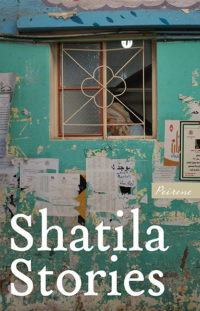We are the ones who have to support our walls
 Shatila Stories
Shatila Stories
– a collaborative novel from Peirene Press
Authors: Omar Khaled Ahmad, Nibal Alalo, Safa Khaled Algharbawi, Omar Abdellatif Alndaf, Rayan Mohamad Sukkar, Safiya Badran, Fatima Omar Ghazawi, Samih Mahmoud, Hiba Mareb
Editors: Meike Ziervogel, Suhir Helal
Translator from Arabic: Nashwa Gowanlock
This novel is the outcome of a series of writing workshops that Peirene Press and the NGO Basmeh & Zeitooneh held at the Shatila refugee camp in Lebanon, which is home to up to 40,000 refugees, largely Palestinian and Syrian. Nine refugee writers wrote their own fictional stories set in Shatila, which the editors helped them to hone and weave together into a single narrative. The outcome is a piece of fiction that gives a true flavour of life in Shatila.
The story, perhaps unsurprisingly, is a series of vignettes. The same characters start and end the story, and others do recur, but some sections are more loosely connected – a name mentioned in one chapter becomes central in another chapter, but then we don’t meet them again.
Where this book’s strength lies is the Shatila setting. Throughout, Shatila is ever-present and brought to life in all its terrifying – and life-threatening – ramshackle chaos. Whether the chapter is about romance, or debt, or bullying, or careers and education, the facts of living in a refugee camp – in this refugee camp – are never forgotten. The photographs at the start and end of the book by Paul Roman also help to place the physical reality of Shatila, though only the writers can establish its emotional truth.
“The days roll into each other in our tiny home, where the rooms are locked in a tight embrace and the weary walls support each other. Damp seeps into them in the bitter winters. And whenever it rains, the water leaks through the ceilings, leaving patches of discoloured and peeling plaster. Here in the Shatila camp, we are the ones who have to support our walls and not the other way around.”
I learned a lot about life there. Shatila is in Beirut and has existed since 1949 so it’s had many years to establish its own infrastructure. There are multiple universities offering education there, from short courses to full degrees, and many of the occupants are highly educated, but the majority are barred from working in Lebanon outside the camp, so poverty is still the rule of thumb. Violence and drugs are rife. The sudden population explosion since the Syrian Civil War began means houses have been built so quickly and cheaply as to be hugely unsafe, and illness and death are disproportionately high.
The novel is an experiment, and I would say the results are mixed. The chapters are a little too varying in tone and quality to quite hang together as a cohesive whole. I wonder if the editing/reworking process was a little rushed. The workshops were held from early 2017 to October, with the translation and editing coming after that, and publication this June. In the world of book publishing, that’s fast. Authors usually spend years honing their first book over many drafts. The two trips that Peirene founder Meike Ziervogel and her co-editor Suhir Helal took to Shatila were funded by the Kickstarter campaign for this book, so perhaps a third trip would have bust the budget, but the final product does feel a little unpolished and that’s a real shame.
“The overwhelming affection I feel for him makes it seem like he is a piece of ribbon holding my soul together. Were the ribbon to tear, my soul would be scattered. Whenever Adam laughs, his laughter smashes through the chains around my heart. And whenever Adam sings, I breathe in the dusty air of Palestine and lose myself in the embrace of my homeland.”
It is still, though, an eye-opening unflinching account of the daily life of many thousands of people, albeit a fictionalized one. Ziervogel’s introduction reveals that some of the details included in the stories that may seem extreme had actually happened to the writers, or members of their close families. She singles out two of the writers – Safiya Badran and Omar Khaled Ahmad – for specific praise, and I hope that there is at least a possibility of a follow-up commission for them; perhaps taking a little more time and coaching.
I do recommend this book, despite its flaws, because it is a perspective that we just don’t hear and yet is sadly a common one in the world today: the refugee in a city-sized camp who lives in a perpetual state of uncertainty. If you read to widen your horizons and metaphorically walk in others’ shoes, this book is an important one.
Published June 2018 by Peirene Press.
Source: I supported the Kickstarter campaign.